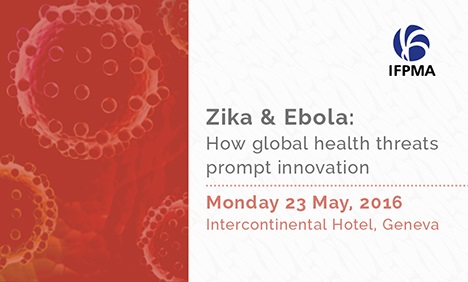Research-based pharmaceutical industry contributes to key global health discussions at 69th World Health Assembly

- New resolutions adopted by the World Health Assembly included rules on relations the World Health Organization can have with the private sector, amongst others; structures for R&D funding and coordination; access to medicines and integrated health services; global sector strategies on HIV, hepatitis and STIs.
- Decisions have been taken also on important public health issues: Anti-microbial Resistance (AMR); the implementation of health-related Sustainable Development Goals (SDGs).
- Numerous satellite events (including two hosted by the IFPMA and several by IFPMA members) enriched the week of deliberations.
Geneva, 6 June 2016 – The 69th World Health Assembly (23-28 May 2016) concluded with 193 countries taking decisions on a number of important issues that will shape the global health agenda and guide the World Health Organization’s (WHO) work in the years to come. As an organization in official relations with the UN, the International Federation of Pharmaceutical Manufacturers and Associations (IFPMA) made three statements at this year’s World Health Assembly.
FENSA – After years of complex negotiations, the World Health Organization’s (WHO) Framework for Engagement with Non-State Actors (FENSA) was adopted. The resolution asks for immediate implementation of the framework and the full establishment of the register of Non State Actors. It provides the organization with policies and procedures on engaging with non-governmental organizations, private sector entities, philanthropic foundations, and academic institutions. IFPMA has official relations with WHO which will help maintain a close working relationship with the organization.
CEWG – The WHO resolution on research and development funding and coordination (Consultative Expert Working Group/CEWG) saw Member States agree to operationalize the Global Observatory on Health R&D, proposing a way forward to a voluntary pool funding mechanism.
AMR – A report presenting options for establishing a global development and stewardship framework for antimicrobials was noted. Member States highlighted the importance of the “one health” approach to anti-microbial resistance (AMR), strengthening infection prevention and control national strategies, surveillance and laboratory capacities, and the need to regulate the use of antibiotics without hampering access.
The WHA resolutions on global drug shortages and children medicines, as well as HIV, viral hepatitis and STIs are important for improving global health and are of particular relevance to the research-based pharmaceutical industry.
IFPMA also noted important discussions around the prevention and control of non-communicable diseases, ending childhood obesity, the Global Vaccine Action Plan and the WHO Member State Mechanism on spurious, falsely labelled, falsified and counterfeit (SSFFC) medical products. The WHA discussions on the implementation of health-related Sustainable Development Goals (SDGs), with a focus on Universal Health Coverage (UHC) are essential to prepare for the UN General Assembly in September 2016. Finally, decisions on continued strengthening of the International Health Regulations in the post-Ebola outbreak are vital to ensure better preparedness for future health emergencies.
In the fringes of the assembly, IFPMA hosted two events. A reception titled, “Zika & Ebola: How global health threats prompt innovation” hosted by the BBC’s Tulip Mazumdar and a side-event hosted in cooperation with International Pharmaceutical Students’ Federation (IPSF), “Raising awareness of SSFFC medical products: empowering people in the fight against fake medicines.”
















